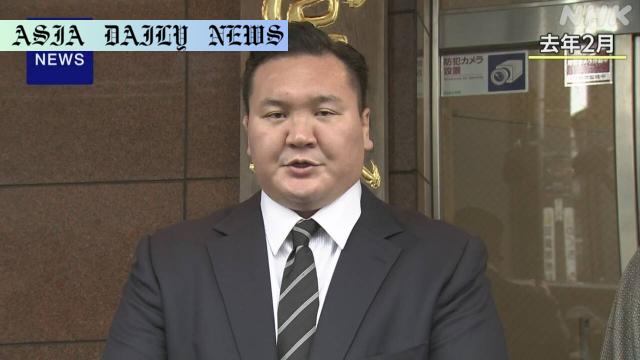Hakuho retires from sumo governance due to stable scandal challenges.

Hakuho: A Legendary Retirement from Sumo
Hakuho, a name that will resonate forever in the annals of sumo wrestling, officially announced his departure from the Japan Sumo Association (JSA). With a record-setting career spanning over two decades and 45 tournament wins, his retirement marks the end of an unparalleled legacy. Although he retired from active wrestling in 2021, his journey in the world of sumo continued as he took charge of the Miyagino Stable. However, his post-retirement career faced significant challenges, notably due to an internal scandal involving one of his wrestlers, which ultimately led to the closure of the stable.
The Rise and Impact of Hakuho
Born in Mongolia, Hakuho embarked on his sumo journey at a young age and rose to prominence, achieving the prestigious title of Yokozuna—Grand Champion. His astounding record of 45 tournament championships cemented his place in history as the most dominant figure in sumo. Beyond his stellar performance in the ring, Hakuho became a cultural bridge between Mongolia and Japan, even acquiring Japanese citizenship in 2019. His influence transcended sport, as he symbolized discipline, honor, and perseverance.
Challenges as a Stable Master
After retiring from wrestling, Hakuho transitioned into his role as the master of Miyagino Stable, adopting the name Miyagino. This new role presented unique challenges, most notably a scandal involving acts of violence committed by one of his wrestlers. The incident led to the demotion of Hakuho to the lowest rank of elder and the eventual closure of the stable. The wrestlers and the master were transferred to the Isegahama stable group, where Hakuho resumed his role as a junior mentor. However, the restrictions and lack of future prospects for reopening his stable led him to contemplate leaving the association.
Decision to Leave the Japan Sumo Association
Hakuho’s decision to leave was not made lightly. His reputation and commitment to sumo were evident in his attempts to resolve conflicts with the association during the Summer Grand Sumo Tournament held in May. However, after unsuccessful negotiations, he submitted his resignation and left the decision in the hands of the association. Sources indicate that he is currently in Mongolia and is set to return to Japan soon to further elaborate on his decision.
Legacy and Future Endeavors
Despite the circumstances surrounding his retirement, Hakuho’s impact on sumo remains undeniable. He leaves behind a legacy not only of unmatched athletic excellence but also of resilience in the face of challenges. While his exact future plans remain uncertain, fans and followers of sumo await his next moves with great anticipation. Some predict that he may venture into coaching or other roles that leverage his deep knowledge of sumo, while others speculate that he may focus on fostering the sport in his home country of Mongolia.
Conclusion
Hakuho’s departure is a poignant moment in the history of sumo wrestling. It underscores not only his monumental contributions to the sport but also the complexities and challenges of transitioning from a celebrated athlete to a governance role. His journey serves as a reminder that even in the face of adversity, true champions redefine success at every phase of their lives.
Commentary
The End of an Era
Hakuho’s retirement from the Japan Sumo Association is a moment of great significance not only for sumo fans but also for sports enthusiasts worldwide. Known for his extraordinary achievements and iconic presence, Hakuho represents the epitome of sportsmanship and dedication. His record of 45 tournament wins is a testament to his hard work and natural talent. As a fan, it is saddening to see him leave the association under these circumstances, but his legacy remains untouched.
Challenges in Post-Retirement Roles
The transition from being an athlete to taking on governance roles often comes with its set of challenges, and Hakuho’s journey was no exception. Taking on the responsibilities of managing Miyagino Stable, his career trajectory experienced turbulence due to the unfortunate incident involving one of his wrestlers. His demotion and the closure of the stable highlighted the rigorous expectations and scrutiny that come with an elder’s role in sumo governance. Nonetheless, Hakuho’s willingness to take responsibility and strive for resolution showcases his integrity.
A Bright Future Awaits
While his departure marks the end of an era in sumo governance, it may pave the way for new opportunities for Hakuho. His understanding of the sport, coupled with his charisma and influence, positions him uniquely to make meaningful contributions in new domains. Perhaps he will focus on nurturing young talent, promoting sumo internationally, or even uplifting the sport in Mongolia. Whatever path he chooses, Hakuho will undoubtedly continue to inspire and shape the future of sumo.


